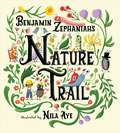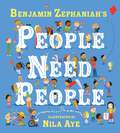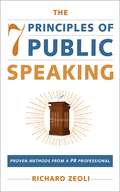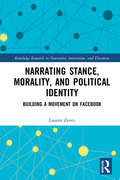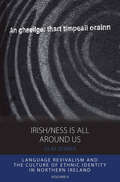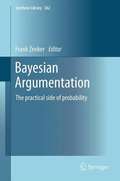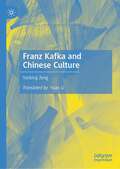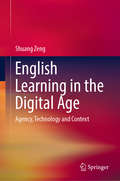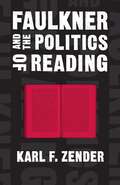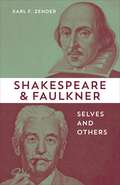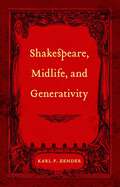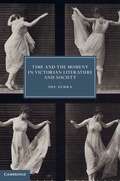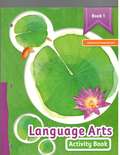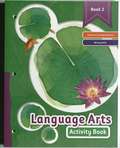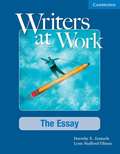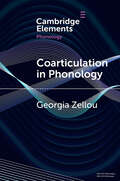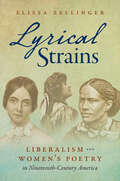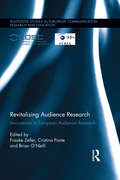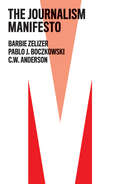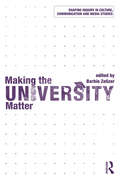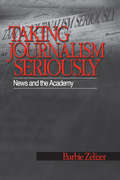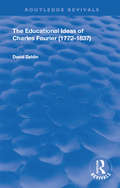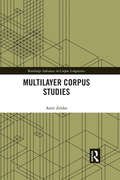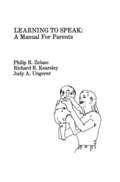- Table View
- List View
Nature Trail: A joyful rhyming celebration of the natural wonders on our doorstep
by Benjamin ZephaniahA joyful celebration of nature and the wonder of the world around us by legendary poet and performer Benjamin Zephaniah, one of The Times' top 50 British post-war writers.At the bottom of my garden, there's a hedgehog and a frog,And a lot of creepy-crawlies living underneath a log . . .All around us, from parks to gardens and flowerpots to pavements, there's a world of wonder just waiting to be discovered. Why not look a little closer and see what you find?This joyful celebration of nature reminds us all to take a closer look at the world around us, and enjoy the wonder of nature wherever we find it. Packed with animals and minibeasts galore, this imaginative rhyming text is perfect for reading aloud.
People Need People
by Benjamin ZephaniahTo walk toTo talk toTo cry and rely on,People will always need people . . .From the creators of Nature Trail comes an uplifting picture book about the power of people, and the importance of connecting with others. This timely poem reminds us all to be kind to one another.Written by legendary poet, Benjamin Zephaniah, one of The Times' top 50 British post-war writers. Beautifully illustrated by Nila Aye.Praise for Nature Trail:A joy to read with small children - Independent
The 7 Principles of Public Speaking: Proven Methods from a PR Professional
by Richard ZeoliFrequently cited as the number one fear among A proven, gimmick-free lesson guaranteed to business executives, public speaking doesn't make anyone a better speaker and come naturally to most people. Pitching an idea, presenter. selling a product, or presenting a program doesn't have to be a stomach-clenching experience to be struggled through. It can be an opportunity to relish and a chance to shine in front of a group. Whether you are selling an idea to two colleagues in a conference room or presenting a major corporate strategy to a ballroom filled with shareholders, the key to success is a clear, confident, memorable presentation. With The 7 Principles of Public Speaking, Richard Zeoli makes the common sense, gimmick-free program he's offered to business leaders and political candidates available to everyone. Whether you are looking to position yourself as an industry expert, extend your sphere of influence, or gain the support and backing of vital constituencies, The 7 Principles of Public Speaking will give you the tools you need to achieve your goal. If you are a polished professional, it will help you hone your skills. If you are a novice communicator, it will help you overcome obstacles and convey your message with confidence, poise, and persuasiveness.
Narrating Stance, Morality, and Political Identity: Building a Movement on Facebook (Routledge Research in Narrative, Interaction, and Discourse)
by Lauren ZentzThis book offers unique insights into the use of Facebook after the 2016 US presidential election, interrogating how users in private groups draw on individual experiences in movement building and identity construction while also critically reflecting on ethnographic practices around social media. The volume draws on the author’s own involvement in a specific Facebook group focused around activism and community organizing in Texas following the 2016 US presidential election. Chapters draw on the frameworks of "small stories" and "stance" to unpack the ways in which group members use parts of their individual stories to signal beliefs to others, present themselves in relation to the group, and signal virtues of moral authority on various pressing political issues. Building on these analyses, Zentz goes on to address ways in which the scales of politics are being navigated and modified at the grassroots level in our highly networked world. This book contributes to ongoing conversations about the realities of internet use within linguistic anthropology and new media studies, and how researchers might seek to account for social media use and access to this data as these technologies develop further. This book is key reading for students and scholars in linguistic anthropology, media studies, and activism and social movement studies.
Irish/ness Is All Around Us: Language Revivalism and the Culture of Ethnic Identity in Northern Ireland
by Olaf ZenkerFocusing on Irish speakers in Catholic West Belfast, this ethnography on Irish language and identity explores the complexities of changing, and contradictory, senses of Irishness and shifting practices of 'Irish culture' in the domains of language, music, dance and sports. The author's theoretical approach to ethnicity and ethnic revivals presents an expanded explanatory framework for the social (re)production of ethnicity, theorizing the mutual interrelations between representations and cultural practices regarding their combined capacity to engender ethnic revivals. Relevant not only to readers with an interest in the intricacies of the Northern Irish situation, this book also appeals to a broader readership in anthropology, sociology, cultural studies, history and political science concerned with the mechanisms behind ethnonational conflict and the politics of culture and identity in general.
Bayesian Argumentation: The practical side of probability (Synthese Library #362)
by Frank ZenkerRelevant to, and drawing from, a range of disciplines, the chapters in this collection show the diversity, and applicability, of research in Bayesian argumentation. Together, they form a challenge to philosophers versed in both the use and criticism of Bayesian models who have largely overlooked their potential in argumentation. Selected from contributions to a multidisciplinary workshop on the topic held in Sweden in 2010, the authors count linguists and social psychologists among their number, in addition to philosophers. They analyze material that includes real-life court cases, experimental research results, and the insights gained from computer models. The volume provides, for the first time, a formal measure of subjective argument strength and argument force, robust enough to allow advocates of opposing sides of an argument to agree on the relative strengths of their supporting reasoning. With papers from leading figures such as Michael Oaksford and Ulrike Hahn, the book comprises recent research conducted at the frontiers of Bayesian argumentation and provides a multitude of examples in which these formal tools can be applied to informal argument. It signals new and impending developments in philosophy, which has seen Bayesian models deployed in formal epistemology and philosophy of science, but has yet to explore the full potential of Bayesian models as a framework in argumentation. In doing so, this revealing anthology looks destined to become a standard teaching text in years to come.
Franz Kafka and Chinese Culture
by Yanbing ZengThis book conducts a comprehensive and in-depth analysis of Franz Kafka’s relation to China. Commencing with an examination of the myriad Chinese cultural influences to which Kafka was exposed, it goes on to explore the ways in which they manifest themselves in canonical stories, such as Description of A Struggle, The Great Wall of China, and An Old Manuscript. This leads the way to thought-provoking comparative studies of Kafka and major Chinese writers and philosophers, such as Zhuang Tzu, Pu Songling, Qian Zhongshu, and Lu Xun. Highlighting kindred philosophical concepts, shared aesthetic tastes, and parallel narrative strategies, these comparisons transcend mere textual analysis, to explore the profound cultural, historical, and philosophical implications of Kafka’s works. Finally, the book turns to an examination Kafka’s impact on modern life in China, including its translation studies, literature, and even its mass culture.
English Learning in the Digital Age: Agency, Technology and Context
by Shuang ZengMoving beyond the ‘Web 2.0’ and ‘digital native’ rhetoric, this book addresses the complex experiences of learners of English as a foreign language (EFL) in a world embedded with interactive and participatory technologies. Adopting a sociocultural perspective, it investigates EFL learners’ behaviours concerning digital technology, and guides exploration into their contextually mediated choices and learning practices in the ‘2.0’ era.The argument is developed on the basis of the findings of a mixed sequential study that focused on 1485 Chinese undergraduates’ use and non-use of online tools and applications outside the English classroom. Particular attention is paid to the role of context and agency when understanding their learning choices and behaviours in the context of digital technology. In particular, the book acknowledges the explanatory power of agency in the minority instances of ‘good practices’ among these EFL learners. At the same time it demonstrates that for most learners, use of the current web is limited and mostly non-interactive. The barriers to ‘2.0’ transfer are largely contextual and the so-called ‘communicative opportunities’ and ‘participatory culture’ in particular did not fit into the learners’ sociocultural context of (language) learning.Overall, the compelling argument proposes that the technology-facilitated changes in EFL practices are a ‘bottom up’ process that is taking place in day-to-day situations and constrained by the learning context within which the learner is situated. Based on these arguments, the book provides a framework that challenges the existing beliefs about (language) learning with online technology, and that contributes to our understanding of how context mediates EFL learners’ behaviours surrounding digital technologies. It is a valuable resource for teachers, researchers and policy makers, providing them with insights into using digital technology to stimulate ‘good learning practices’ outside the classroom.
The Semiotics of Exile in Literature
by Hong ZengFurthering the scholarship on writers and artists as diverse as Lord Byron, Edvard Munch, Sylvia Plath, and Jorge Luis Borges, Zeng probes the semiotics of exile. In artistic traditions the world over, exile exerts a potent and complex mythmaking power - whether it is manifest as a geographical dislocation or as a sense of cultural or psychological alienation.
Faulkner and the Politics of Reading (Southern Literary Studies)
by Karl F. ZenderWith this study Karl F. Zender offers fresh readings of individual novels, themes, and motifs while also assessing the impact of recent politicized interpretations on our understanding of Faulkner’s achievement. Sympathetically acknowledging the need to decenter the canon, Zender’s searching interrogation of current theory clears a breathing space for Faulkner and his readers between the fustier remnants of New Criticism and the excesses of post-structuralism.Each chapter opens with a balanced presentation of the genuine gifts contemporary theory has bestowed on our comprehension of a particular novel or problem in Faulkner criticism and then proceeds with a groundbreaking reading. “The Politics of Incest” challenges older psychoanalytic interpretations of Faulkner’s use of the incest motif, and “Faulkner’s Privacy” defends the novelist’s difficulty or “reticence” as an aesthetic resistance against the rude candor of deregionalized and depersonalized culture. Subsequent chapters take up the volatile issues of Faulkner’s representations of women and of African Americans, and a close reading of the classic “Barn Burning” critiques the current tendency to blur the concepts of patriarchy and paternity. The elegiac final chapter, “Where is Yoknapatawpha County?” draws on a comparison with John Updike’s Pennsylvania fiction and a reading of Joan Williams’s The Wintering to explore Faulkner’s disinclination to represent the quotidian realities of southern life in his later novels. Zender shows that Faulkner’s stylistic withdrawal attempts to “transform into beauty” his alienation from the postwar world and his fear of aging. That Faulkner and the Politics of Reading itself recovers and gives new luster to Faulkner’s beauty will surely please, in the author’s words, “those readers . . . for whom literature is less a mechanism of social change than a source of pleasure.” The originality of its critical vision will inspire Faulkner scholars, students of American literature, and general readers.
Shakespeare and Faulkner: Selves and Others
by Karl F. ZenderShakespeare and Faulkner explores the moral and ethical dilemmas that characters face inside themselves and in their interactions with others in the works of these two famed authors. Karl F. Zender’s characterological study offers insightful, critically rigorous, and at times quite personal analyses of the complicated figures who inhabit several major Shakespeare plays and Faulkner novels. The two parts of this book—the first of which focuses on the English playwright, the second on the Mississippi novelist—share a common methodology in that they originate in Zender’s history as a teacher of and writer on the two authors, who until now he generally approached separately. He emphasizes the evolving insights gleaned from reading these authors over several decades, situating their texts in relation to shifting trends in criticism and highlighting the contemporary relevance of their works. The final chapter, an extended discussion of Faulkner’s Intruder in the Dust, attempts something unusual in Zender’s critical practice: It relies less on the close textual analysis that characterizes his previous work and instead explores the intersections between events depicted in the novel and his own life, both as a child and as an adult. Shakespeare and Faulkner speaks to the power of literature as a form of pleasure and of solace. With this work of engaged and thoughtful scholarly criticism, Zender reveals the centrality of storytelling to human beings’ efforts to make sense both of their journey through life and of the circumstances in which they live.
Shakespeare, Midlife, and Generativity: A Biography
by Karl F. ZenderThe life expectancy in Shakespearean times averaged only about twenty-five to thirty-five years, but those who survived the illnesses of infancy and childhood could look forward to a long life with nearly the same level of confidence as someone living now. But even so long ago, some faced conflicts in their middle and later years that remain familiar today. In Shakespeare, Midlife, and Generativity, Karl F. Zender explores William Shakespeare's depictions of middle age by examining the relationships between middle-aged parents -- mainly fathers -- and their children in five of his greatest plays. He finds that the middle-aged characters in King Lear, Macbeth, Antony and Cleopatra, The Winter's Tale, and The Tempest -- much like their modern counterparts -- experience a fear of aging and debility.Representations of middle age occur throughout the Shakespearean canon, in forms ranging from Jaques' "seven ages" speech in As You Like It to the emphasis -- almost an obsession -- in many plays on relations between the generations. Lear, Zender shows, tries to forestall the approach of old age with a fantasy of literal rebirth in his relationship with Cordelia. Macbeth depicts an even more urgent struggle against midlife decline, while in Antony and Cleopatra, Shakespeare portrays two characters in midlife crisis who attempt to redefine their identities by memorializing their former status and power, now lost. Drawing on Erik Erikson's theory of generativity -- a midlife shift from advancing one's own career to aiding a younger generation -- Zender explores the difficulties Shakespeare's characters face as they transfer power and authority to their children and others in the next generation. Paying careful attention to the plays' moral and ethical implications, he demonstrates how Shakespeare's innovative depiction of the midlife experience focuses on internal psychological understanding rather than external actions such as ceremony and ritual.Illuminating and engaging, Shakespeare, Midlife, and Generativity offers a fresh analysis of several of Shakespeare's most important plays and explores a profound, centuries-old perspective on the challenges inherent in middle age.
Time and the Moment in Victorian Literature and Society
by Sue ZemkaSudden changes, opportunities, or revelations have always carried a special significance in Western culture, from the Greek and later the Christian kairos to Evangelical experiences of conversion. This fascinating book explores the ways in which England, under the influence of industrializing forces and increased precision in assessing the passing of time, attached importance to moments, events that compress great significance into small units of time. Sue Zemka questions the importance that modernity invests in momentary events, from religion to aesthetics and philosophy. She argues for a strain in Victorian and early modern novels critical of the values the age invested in moments of time, and suggests that such novels also offer a correction to contemporary culture and criticism, with its emphasis on the momentary event as an agency of change.
Writers at Work: The Essay
by Dorothy E. Zemach Lynn Stafford-YilmazThe Writers at Work series takes beginning to high intermediate-level writing students through a process approach to writing. The series is intended primarily for adults whose first language is not English, but it may also prove effective for younger writers or for native speakers of English who are developing their competence as independent writers in English.
Coarticulation in Phonology (Elements in Phonology)
by Georgia ZellouThere is debate about how coarticulation is represented in speakers' mental grammar, as well as the role that coarticulation plays in explaining synchronic and diachronic sound patterns across languages. This Element takes an individual-differences approach in examining nasal coarticulation in production and perception in order to understand how coarticulation is used phonologically in American English. Experiment 1 examines coarticulatory variation across 60 speakers. The relationship between speaking rate and coarticulation is used to classify three types of coarticulation. Experiment 2 is a perception study relating the differences in realization of coarticulation across speakers to listeners' identification of lexical items. The author demonstrates that differences in speaker-specific patterns of coarticulation reflect differences in the phonologization of vowel nasalization. Results support predictions made by models that propose an active role by both speakers and listeners in using coarticulatory variation to express lexical contrasts and view coarticulation as represented in an individual's grammar.
Lyrical Strains: Liberalism and Women's Poetry in Nineteenth-Century America
by Elissa ZellingerIn this book, Elissa Zellinger analyzes both political philosophy and poetic theory in order to chronicle the consolidation of the modern lyric and the liberal subject across the long nineteenth century. In the nineteenth-century United States, both liberalism and lyric sought self-definition by practicing techniques of exclusion. Liberalism was a political philosophy whose supposed universals were limited to white men and created by omitting women, the enslaved, and Native peoples. The conventions of poetic reception only redoubled the sense that liberal selfhood defined its boundaries by refusing raced and gendered others. Yet Zellinger argues that it is precisely the poetics of the excluded that offer insights into the dynamic processes that came to form the modern liberal and lyric subjects. She examines poets—Frances Sargent Osgood, Elizabeth Oakes Smith, Frances Ellen Watkins Harper, Edna St. Vincent Millay, and E. Pauline Johnson—whose work uses lyric practices to contest the very assumptions about selfhood responsible for denying them the political and social freedoms enjoyed by full liberal subjects. In its consideration of politics and poetics, this project offers a new approach to genre and gender that will help shape the field of nineteenth-century American literary studies.
Revitalising Audience Research: Innovations in European Audience Research (Routledge Studies in European Communication Research and Education)
by Frauke Zeller Cristina Ponte Brian O'NeillThe revitalisation of audience studies is not only about new approaches and methods; it entails a crossing of disciplines and a bridging of long-established boundaries in the field. The aim of this volume is to capture the boundary-crossing processes that have begun to emerge across the discipline in the form of innovative, interdisciplinary interventions in the audience research agenda. Contributions to this volume seek to further this process though innovative, audience-oriented perspectives that firmly anchor media engagement within the diversity of contexts and purposes to which people incorporate media in their daily lives, in ways often unanticipated by industries and professionals.
The Journalism Manifesto (The Manifesto Series)
by Barbie Zelizer Pablo J. Boczkowski C. W. AndersonDrawing on the collaborative expertise of three senior scholars, The Journalism Manifesto makes a powerful case for why journalism has become outdated and why it is in need of a long-overdue transformation. Focusing on the relevance of elites, norms and audiences, Zelizer, Boczkowski and Anderson reveal how these previously integral components of journalism have become outdated: Elites, the sources from which journalists draw much of their information and around whom they orient their coverage, have become dysfunctional; The relevance of norms, the cues by which journalists do newswork, has eroded so fundamentally that journalists are repeatedly entrenching themselves as negligible and out of sync; and because audiences have shattered beyond recognition, the correspondence between what journalists think of as news and what audiences care about can no longer be assumed. This authoritative manifesto argues that journalism has become decoupled from the dynamics of everyday life in contemporary society and outlines pathways for fixing this essential institution of democracy. It is a must-read for students, scholars and activists in the fields of journalism, media, policy, and political communication.
Making the University Matter (Shaping Inquiry in Culture, Communication and Media Studies)
by Barbie ZelizerMaking the University Matter investigates how academics situate themselves simultaneously in the university and the world and how doing so affects the viability of the university setting. The university stands at the intersection of two sets of interests, needing to be at one with the world while aspiring to stand apart from it. In an era that promises intensified political instability, growing administrative pressures, dwindling economic returns and questions about economic viability, lower enrolments and shrinking programs, can the university continue to matter into the future? And if so, in which way? What will help it survive as an honest broker? What are the mechanisms for ensuring its independent voice? Barbie Zelizer brings together some of the leading names in the field of media and communication studies from around the globe to consider a multiplicity of answers from across the curriculum on making the university matter, including critical scholarship, interdisciplinarity, curricular blends of the humanities and social sciences, practical training and policy work. The collection is introduced with an essay by the editor and each section has a brief introduction to contextualise the essays and highlight the issues they raise.
Taking Journalism Seriously: News and the Academy
by Barbie Zelizer"Barbie Zelizer provides enormous service to students and scholars with this comprehensive and highly persuasive critique of the literature in and about journalism as both process and practice, as a profession and an industry. Zelizer takes a step back to look at what we know about news, and she does not pull her punches in pointing out what we do not know." -Linda Steiner, Rutgers University "Zelizer′s encyclopedic review of scholarly studies of journalism fills an important need for researchers, and comparing that scholarship across disciplines, generations and countries makes it even more valuable. . . Her analyses will be invaluable for media research and should also spur interest in journalism among the social science and other disciplines she studied. . .The book is an impressive achievement." -Herbert J. Gans, Columbia University and author of Democracy and the News "Taking Journalism Seriously is a refulgent analysis of the condition of journalism studies. Zelizer has produced a critical and lasting contribution to our understanding of the position of news, journalism and journalism practice within the disciplines of political science, sociology, psychology, philosophy, language and cultural studies. This excellent book is an engaging and sophisticated treatise on both the historical and contemporary theoretical perspectives of journalism scholarship." -Howard Tumber, City University, London How have scholars tended to conceptualize news, newsmaking, journalism, journalists, and the news media? Which explanatory frames have they used to explore journalistic practice? From which fields of inquiry have they borrowed in shaping their assumptions about how journalism works? In Taking Journalism Seriously: News and the Academy, author Barbie Zelizer discusses questions about the viability of the field of journalism scholarship and examines journalism as a discipline, a profession, a practice, and a cultural phenomenon. Taking Journalism Seriously argues that scholars have remained too entrenched within their own disciplinary areas resulting in isolated bodies of scholarship. This is the first book to critically survey journalism scholarship in one volume and organize it by disparate fields. The book reviews existing journalism research in such diverse fields as sociology, history, language studies, political science, and cultural analysis and dissects the most prevalent and understated research in each discipline. The author provides a critical mapping of the field of journalism studies and encourages academics to look at journalism from various disciplinary perspectives. Taking Journalism Seriously advocates a realignment of the ways in which journalism has traditionally been conceptualized and urges scholars to think anew about what journalism is as well as reflect on why they see it as they do. Taking Journalism Seriously is designed for undergraduate and graduate students in advanced courses on Journalism and Journalism Studies. It will also be of interest to scholars, academics, and researchers in the fields of Journalism, Communication, Media Studies, Sociology, and Cultural Studies.
The Educational Ideas of Charles Fourier: 1772-1837 (Routledge Revivals)
by David ZeldinOriginally published in 1969, this book aims to show that Charles Fourier has much to say that is of interest to modern edcationlists. Fourier hardly ever figures in histories of education because only recent developments in educational practice have shown his ideas to be of topical and practical importance to the schoolteacher and the planner of today. Fourier devised a system of education to suit a self-infulgent, democratic society, in which children's energies could be used in ways which were both socially useful and personally rewarding. He was a pioneer advocate of comprehensive education, so as to establish harmy between classes. He urged vocational training and guidance, so as to establish harmony between men and their work. He devised close links between education and industry, to bring pleasure into both school and work and to integrate the two. He was one of the first to plan social service to the community by children. This prophetic though eccentric writer, sometimes extravagant, often amusing, but always endearing, who has already exerted much influence on socialist theory, deserves to be better known by students of education.
Multilayer Corpus Studies (Routledge Advances in Corpus Linguistics)
by Amir ZeldesThis volume explores the opportunities afforded by the construction and evaluation of multilayer corpora, an emerging methodology within corpus linguistics that brings about multiple independent parallel analyses of the same linguistic phenomena, and how the interplay of these concurrent analyses can help to push the field into new frontiers. The first part of the book surveys the theoretical and methodological underpinnings of multilayer corpus work, including an exploration of various technical and data collection issues. The second part builds on the groundwork of the first half to show multilayer corpora applied to different subfields of linguistic study, including information structure research, referentiality, discourse models, and functional theories of discourse analysis, synthesizing these different discussions in a detailed case study of non-standard language in its concluding chapter. Advancing the multilayer corpus linguistic research paradigm into new and different directions, this volume is an indispensable resource for graduate students and researchers in corpus linguistics, syntax, semantics, construction studies, and cognitive grammar.
Learning To Speak: A Manual for Parents
by P. R. Zelazo R. B. Kearsley J. A. UngererFirst published in 1984. Routledge is an imprint of Taylor & Francis, an informa company.
